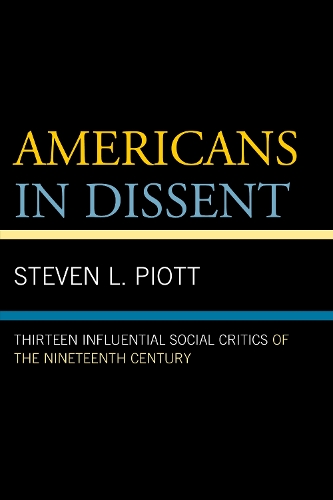
Americans in Dissent: Thirteen Influential Social Critics of the Nineteenth Century
(Hardback)
Available Formats
Publishing Details
Americans in Dissent: Thirteen Influential Social Critics of the Nineteenth Century
By (Author) Steven L. Piott
Bloomsbury Publishing PLC
Lexington Books
15th October 2014
United States
Classifications
General
Non Fiction
History of the Americas
973.5
Physical Properties
Hardback
250
Width 164mm, Height 234mm, Spine 22mm
499g
Description
Americans in Dissent is designed as a collection of biographical essays written for general readers and undergraduates that focuses on the topic of American dissent during the period from 1830 to 1890. Centered on influential nineteenth-century social critics, this volume shifts the focus of American reform away from romantic attempts at reforming the individual to more pragmatic efforts aimed at confronting social, economic, and political problems. Coexisting with what seemed to be a preponderance of romantic idealism during much of the period was an undercurrent of genuine realism. Instead of looking through the prism of a pre-modern society, many of these dissenters focused on how society was becoming increasingly acquisitive and entrepreneurial. They were among the first to question laissez-faire individualism and unrestrained industrial capitalism and anticipated the critiques of later Progressive Era reformers. Representing a wide range of interests, each of the selections features a fascinating and provocative man or woman who offered a fundamental critique of American society and made a significant contribution to the development of the reform ethos that characterized the period.
Reviews
Piott provides short essays about 19th-century reformers that focus on their careers as social critics. Most US historians should recognize the 13 individuals in the 12 chapters as important social critics, but many other readers will not. Piott selected them because they have become underappreciated as reformers or mostly forgotten as such. 'The individuals featured in the volume,' Piott argues, 'existed apart from the mainstream of dissent in the nineteenth century.' The selected reformers are Sarah G. Bagley, Thomas Skidmore and George Henry Evans, William H. Sylvis, Oliver Hudson Kelley, George Perkins Marsh, Elizabeth Cady Stanton, Frances Willard, Helen Hunt Jackson, T. Thomas Fortune, Thomas Nast, Jacob Riis, and Edward Bellamy. Piott explains that 'romantic' reformers were the norm during the early 19th century, but by mid-century, reformers emerged who were 'realists.' What is revealing is that there was a lack of sustained cooperation between like-minded reformers. A good supplement for undergraduate history collections on the 19th-century US and as background for classes covering the Progressive Era. Summing Up: Recommended. Most levels/libraries. * CHOICE *
Despite the tiresome conservative injunction 'America: Love It or Leave It,' a venerable American tradition has sought to change the country precisely out of love for it. Americans in Dissent reminds us of the many-sidedness of nineteenth-century lives devoted to American social reform, including labor, women's, black, Indian, environmental, and other causes that burn with present-day urgency. What is most striking is the common concern for political economy and equality prominent in this ensemble drawn together by Steven L. Piott. -- Christopher Phelps, University of Nottingham
Americans in Dissent: Thirteen Influential Social Critics of the Nineteenth Century is a fine, accessible survey of leading ideas and people in nineteenth-century America.This book is indispensable for students new to American reform. -- Patrick Rael, Bowdoin College
Author Bio
Steven L. Piott is a professor of history at Clarion University of Pennsylvania.
